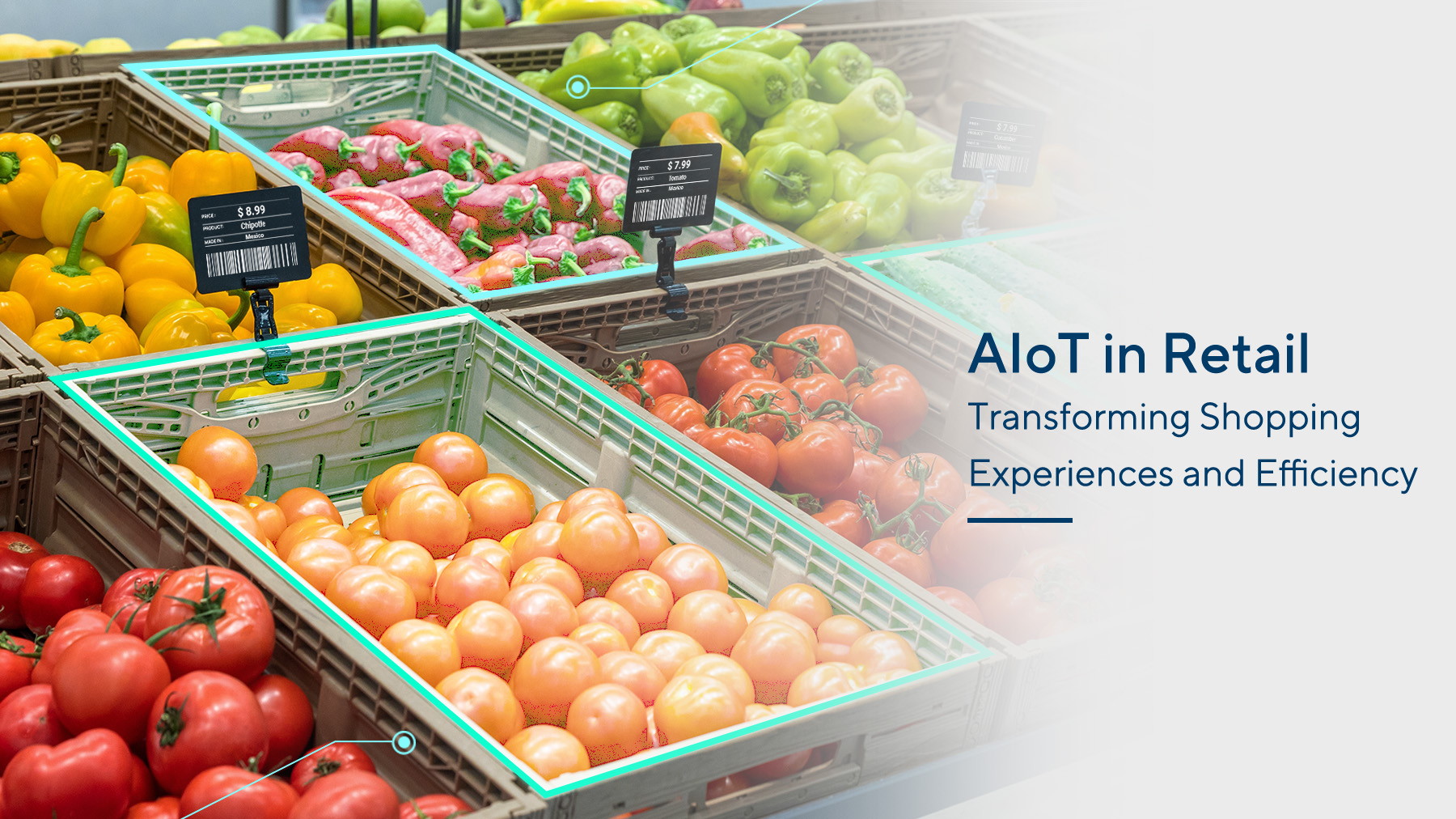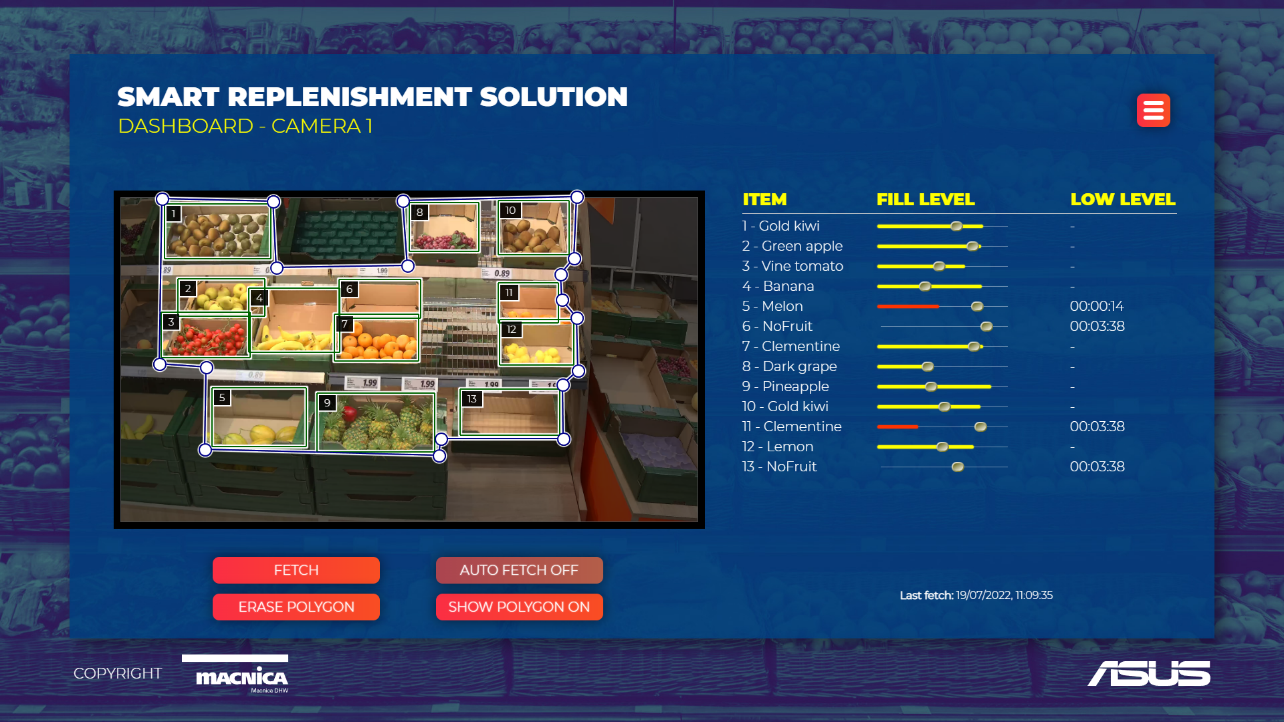How is AIoT Transforming the Retail Industry

Artificial Intelligence of Things (AIoT) combines AI and IoT to create smart, connected systems that can analyze and respond intelligently to data collected from IoT devices. IoT systems facilitate the collection and exchange of data among various devices and AI analyzes the data to drive smart decision-making ― without the need for human intervention.
AIoT solutions aim to improve efficiency, automation, decision-making, and predictive capabilities across various applications, such as smart city development, healthcare, manufacturing, and retail. In smart city applications, for instance, AI-powered sensors monitor and optimize traffic flow in real-time by leveraging advanced analytics, helping enhance urban mobility, reduce congestion, and even improve air quality. Other examples include AI-driven surveillance systems equipped with facial recognition to bolster public safety and security. In healthcare, wearable devices analyze real-time patient data, supporting early diagnosis and personalized treatment plans. Alternately, manufacturing industries employ predictive maintenance powered by AIoT to minimize downtime and extend equipment lifespan, and retailers use AI-enhanced IoT devices to deliver personalized shopping experiences and optimize inventory management. These applications showcase the transformative potential of AIoT in creating smarter, more efficient systems tailored to modern needs.
Pain Points for Traditional Retailers
Today, traditional retailers face several challenges that hinder operations and competitiveness, including difficulties related to inventory management and data integration, labor shortages and other issues. Inventory management is often inefficient due to reliance on manual processes and disconnected systems, which can increase storage costs and result in lost sales in the long run. Data integration is another issue, as retailers struggle to consolidate data from multiple sources such as online platforms, physical stores, and supply chains, often limiting their ability to understand customer behavior and accurately forecast trends in order to make informed data-driven decisions. Labor shortages further exacerbate operational difficulties, causing delays in restocking, longer checkout times, or inadequate customer service. Recruiting and retaining skilled employees has become increasingly challenging, especially with rising labor costs and changing workforce expectations.
These issues directly affect the customer experience, with longer wait times, difficulties in finding products, and a lack of personalized service, which ultimately drives customers toward more agile online competitors. Many retailers struggle to leverage customer data for targeted marketing or personalized recommendations, missing opportunities to engage consumers effectively. Together, these pain points create operational inefficiencies and erode customer loyalty, making it crucial for retailers to adopt smarter, technology-driven solutions.
Smart Retail To the Rescue
Fortunately, AIoT adoption in the retail space is here to help deal with these challenges and more. An exemplary case is the Smart Replenishment solution co-created by ASUS IoT and Macnica DHW. By utilizing fine-grained image recognition and deep-learning AI algorithms, this solution allows food retailers to implement an automated strategy for the restocking of non-barcoded perishable goods within their stores. Capable of running 24/7, it delivers the continuous visibility needed to respond to changing stock levels of different types, including produce, so all can be kept at optimal levels. The need for laborious manual inspection is eliminated, meaning staff can concentrate on their other responsibilities. Using the data acquisition and AI accelerator hardware, plus AI analytics from ASUS IoT, store managers are able to take the guesswork out of restocking goods. This technology is complemented by the user interface (UI) and dashboard capabilities provided by software specialist Macnica DHW. The result is a fully-scalable, easy-to-configure end-to-end platform that is easy to deploy in any store environment.

The ASUS EBS-4U is the latest hardware solution designed to support smart replenishment. Available in both barebone and full-system configurations, EBS-4U features a standard 19-inch 4U rackmount chassis and supports ATX, microATX, and Mini-ITX motherboards equipped with Intel® H110, H310, H610, Q170, Q470E, Q670E, or R670E chipsets. With up to seven full-height PCI/PCIe® expansion slots and compatibility with standard ATX power supplies ranging from 300 to 1300 watts, the EBS-4U delivers exceptional performance and flexibility. Designed for durability in demanding environments, it ensures reliable operation while offering the adaptability needed for various retail applications.
Easily-adopted AIoT solutions in retail also include self-ordering kiosks equipped with touchscreens, barcode scanners, and payment modules. These kiosks enable personalized interactions, analyze customer behavior, and automate services such as checkouts and information retrieval, providing a seamless, self-service experience while minimizing labor costs. The ASUS N5105I-IM-A Mini-ITX industrial motherboard serves as a powerful foundation for such kiosks. Its compact, rugged design and wide temperature-range tolerance allows for integration in a wide range of settings, making it ideal for retail environments. With stable computing performance, the motherboard ensures a smooth end-user purchasing experience, and its low-power consumption offers a significant advantage. It also features an MSR/RFID reader for credit card payments, an RJ11/DIO connector for cash drawers, a 3-watt amplifier for mono-out audio, and an integrated buzzer for sending notifications in retail applications.
The future of AIoT in retail is boundless, offering endless possibilities. In a rapidly evolving market, adopting AIoT is no longer just an opportunity—it’s a necessity for staying competitive and driving profitability. By investing in AIoT technologies, retailers can realize the potential to revolutionize their operations through automation, personalization, and real-time insights. Leveraging AIoT empowers businesses to deliver faster, smarter services, elevate customer experiences, and optimize operational efficiency―setting the stage for sustained growth and success in the dynamic world of retail.
To learn more, contact ASUS IoT or visit the ASUS IoT website.
The ASUS EBS-4U product series includes both barebone and system options, utilizing a standard 19-inch 4U rackmount chassis in black. The chassis supports ATX, Micro-ATX, and Mini-ITX motherboards equipped with Intel® H110, H310, H610, Q170, Q470E, Q670E, or R670E chipsets, and provides up to seven full-height PCI/PCIe expansion slots. Additionally, it is compatible with standard ATX power supplies, with power ratings ranging from 300W to 1300W.
